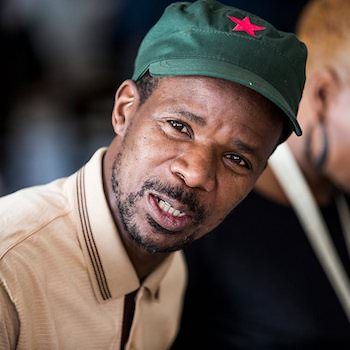Thamsaqa Hukwe

Summary: Thamsaqa Hamilton Hukwe has committed his life to the struggle for the transformation of the landless, the homeless, the poor, and the working class by fearlessly challenging extractive policies of the regime in Pretoria. As National Coordinator for the Gauteng Housing Crisis Committee, an ardent believer in the philosophy of the black-conscious movement and in the aspirations of the anti-apartheid movement, Hukwe organises and mobilises workers, students, and citizens to challenge policies that cause suffering. His work has not been without challenges: He has faced several assassination attempts, and at other times he has been threatened, arrested, and tortured; his family is also at risk. Despite these challenges, Hukwe continues to serve his community.
Profile: Thamsaqa Hamilton Hukwe’s parents were involved in the struggles of homeless people and were part of a network that resisted illegal evictions in South Africa's urban communities. Hukwe has followed in their activism, beginning in the 1990s, when he worked with youth movements to decolonise the education system. Hukwe believes in systems that will transform the lives of the majority.
“I have been involved in the human rights struggles since my high school days in Thaba Jabula Senior Secondary School,” he says, “and still involved. During my school days I worked with both Azanian Student Convention from Vista University in Soweto and the Pan Africanist Student Organization. We also worked with fees-must-fall activists, mainly from the University of Johannesburg and Wits, in trying to link up student struggles with community struggles. When I was working as a call center agent in Smallan Group, I became actively involved in organizing workers for a workers’ union known as BIFAWU—Banking Insurance Finance and Assurance Workers Union.”
Today Hukwe is the National Coordinator of the Gauteng Housing Crisis Committee (GHCC) and the Organiser for Abahlali Base Freedom Park, both of which promote the right to decent shelter for its residents. Despite being Africa's economic giant, most of South Africa’s urban citizens have no decent shelter and live in slums. Hukwe’s job: “I am currently tasked by GHCC to coordinate a process to bring all land and housing activists together at a national level.”
He has met with some success: “Through the land occupation struggles in Johannesburg South, we were able to force the government to respond with a program known as Rapid Land Release Program and a project known as Mega Housing Development Projects. For the community of Freedom Park, Eldorado Park, Lehae, and surrounding communities, a piece of land known as Southern farms was identified by the state for Mega Housing Development and Rapid Land Release.”
Despite his successes, Hukwe acknowledges the challenges:
“The main challenge we are currently confronted with is that our victory for land and housing has not translated into economic development for our communities, and the leading community activists get replaced by big political bosses who decide who must benefit in the economic opportunities that come with Mega Housing Development and Rapid Land Release programs. The Freedom Park land occupation was faced with many challenges which amongst them was evictions, divided community leadership, and infiltration by the governing party.”
To counter these challenges, Hukwe and his colleagues came up with a political education programme to inform members, especially young people, of their rights. The government eventually veered from eviction to development and then agreed to build primary and high schools in Freedom Park—more successes for Hukwe and his group. They then initiated youth clubs and educational programs in the community.
All this, however, was met with serious blowback:
“The risk that we faced was intimidation, harassment, and attempt at our lives by members of the governing party who felt threatened by our activism. We also faced arrest and shooting during community mass action and land occupation struggles. . . . I was arrested in 2007, and attempts to kill me were made in 2015 and 2016. The governing party members were organised throughout Johannesburg region to come and burn my house,” said Hukwe.
Another sacrifice was Hukwe’s time with his family: “We spent very little time with our families and were always occupied with problems of the community.”
Nonetheless, Hukwe soldiers on, maintaining that he will never tire, since activism is his “life purpose”.
